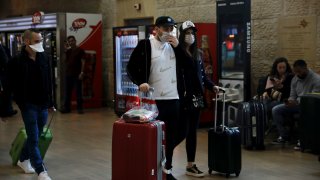
The coronavirus has infected more than 80,000 people worldwide. Many cases so far have been in countries that are popular tourist destinations: 78,000 in China, 1,200 in South Korea, 800 in Japan, and 300 in Italy. This scare has prompted a 60% jump in insurance policies sold in the United States in the past month, according to InsureMyTrip.
If you have booked a flight, hotel, tour, or other travel arrangements and you’re now nervous about traveling, here’s what you need to know about how your travel insurance will and won’t cover you.
If I cancel my trip because of coronavirus, will my travel insurance cover me?
Most kinds of travel insurance only cover you if you cancel your trip because of a reason covered in your policy. Covered reasons vary by policy, according to travel insurance search engine Squaremouth, but three of the most common are:
- A significant injury, illness, or death affecting you, a traveling companion, or a family member
- Severe weather that prevents you from reaching your destination
- A terrorist attack at your destination
Coronavirus isn’t likely to fall under a covered reason unless you can’t travel because you have it. “The event impacting the trip must be listed on the travel insurance certification and unfortunately, viral outbreaks are not covered,” says Kasara Barto of Squaremouth.
Plus, the coronavirus outbreak is now a known risk that is expected to disrupt travel, and so insurers would exclude it from newly purchased coverage, according to a Squaremouth explainer.
U.S. & World
News from around the country and around the globe
This holds true if you buy insurance through one of the businesses you are patronizing on your trip (an airline, hotel, car rental service), or if your credit card provides you with travel insurance upon purchase of your trip, Barto says.
Even if you’re not covered, Barto suggests calling your airline, hotel, and other travel operators directly. Many airlines are waiving change fees for travelers who planned to travel to destinations where the outbreak has worsened. And Barto says she’s heard that many companies are making exceptions for people wanting to cancel or postpone their trips.
I haven’t bought my tickets yet. What insurance should I get?
If you have any upcoming trips this year and want to make sure you’re covered for any coronavirus-fueled worries, buy so-called “cancel for any reason” travel insurance. True to its name, this kind of insurance lets policyholders cancel trips for any reason. “That’s the only type of travel insurance policy that will cover travels for those concerns,” Barto says.
If you recently booked your travel, you might still get a policy as an add-on. After purchasing your flight, you usually have somewhere between 14 and 21 days to get “cancel for any reason” insurance, Barto says.
However, this insurance is pricier, warns Jesse Neugarten, CEO of Dollar Flight Club. “These top-tier insurance plans are ideal for the current travel climate,” he says. “The only drawback that you may consider is that these policies can cost as much as 50% more than a standard travel insurance policy.”
The typical travel insurance policy usually costs between 4% and 8% of the price of the trip, according to Travel Insurance Review. But premium plans, including “cancel for any reason” coverage, can cost closer to 10% to 12% of the total trip.
What places are unsafe to travel?
Right now, China and South Korea are on the Center for Disease Control’s Warning Level 3. This means the CDC is advising “travelers avoid all nonessential travel to the following destinations,” according to their site. Italy and Japan are on Alert Level 2, which means that “older adults and those with chronic medical conditions should consider postponing nonessential travel.”
Hong Kong is on Watch Level 1, but the CDC makes no recommendation of postponing travel. Same for Singapore, Taiwan, and Thailand.
As for cruises, the CDC recommends travelers “reconsider” voyages within Asia.
Confirmed Coronavirus Cases
Source: NBC News, staff reports
This story first appeared on Grow.acorns.com. More from Grow:
- How coronavirus is moving the market and why it doesn’t have to change your investing strategy
- The most expensive mistake you can make with your 401(k) when you change jobs
- The US stock market has gotten less calm — and that’s actually good for you



